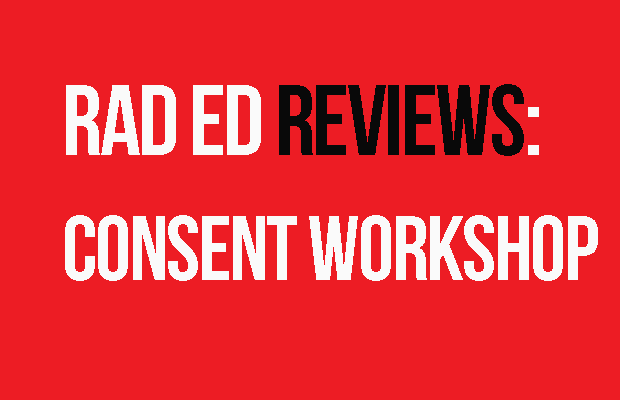CONTENT WARNING: SEXUAL ASSAULT
The SRC’s Women’s Officers-elect Vivienne Guo and Ellie Wilson held an interactive consent workshop as a part of Radical Education Week this week. Their aim was to help students consider the definition of ‘consent’. The workshop highlighted the consequences that emerge as a result of that consent being violated, the ways in which rape myths function, and the social structures that are linked with ongoing epidemics of sexual violence.
Guo commenced the event after an Acknowledgment of Country by referencing Indigenous Officer Akala Newman’s consideration of the colonisation of Australia as the rape of this land. She spoke about how this thinking engages with discourses around sexual assault. Guo also urged the audience to consider the tokenism that surrounds us as inhabitants of a settler-colonial state, and the importance of working with groups such as Grandmothers Against Removals (GMAR), Indigenous Social Justice Association (ISJA), and actively fighting for Indigenous justice, as “there can be no social justice without it.”
The workshop was structured in a series of engagement based activities. Audiences were asked to write down words that they associated with “consent”, before discussing why they felt these were connected. Words like “comfort,” “freedom,” “autonomy,” “communication,” and “rescindable” were common and were considered by the group to be essential in creating and maintaining a safe environment.
Guo also presented a discussion on myth-busting. Common myths surrounding consent and assault were deconstructed and the audience learnt how these concepts activate negative societal reactions to sexual assault. Sexual assault myths work to empower rapists, perpetuate rape culture, and blame the victim. Attendees talked about the myths they had come across. Behaviour can only be viewed as sexual assault if it is violent or penetrative was one of these. Audiences then worked on busting these myths. Sexual predators are not just strangers lurking in dark alleys. Usually people who have been sexually assaulted have had such acts forced upon them by people they know. The workshop considered how perpetrators are not “easy to spot,” and can come from every class, religion, race, and culture. As was also mentioned, sexual violence is not a crime of passion. It is just a crime.
Audiences examined the legal definition of consent in New South Wales and how it compares to social definitions, the principles of natural justice, and the manners in which sexual assault laws can start conversations around power structures in relationships. Governmental organisations tend to focus on what consent is not, and how consent based on coercion or deceit is not real consent at all. But laws surrounding consent and the sentencing of perpetrators are written in a way that often puts the burden of proof on the victim. Guo expressed that producing evidence in such cases is not always — if ever — possible, and that threats of defamation often end legal cases before they start. Legal cases place an incredible financial and emotional toll on the victim and the insensitivity of the law in responding to human trauma can be permanently damaging. Concerns of reputational damage affect how society manages sexual trauma and assault. Cultures of shame strongly tie into responses to assault, and victims are often weary of coming forward because of this.
The workshop stressed the political power imbalances that impact how the public navigates sexual and romantic relationships. Wilson talked about socio-economic power structures and dynamics and how they play into people’s personal experiences with sexuality. She highlighted the bitter truth that some groups are inherently marginalised by the way society functions, a fact that plays into the power plays inherent in sexual assault, and justice for those who have been assaulted. Power imbalances, both political and social, affect these relationships. Interactions with organisations, collectives and communities are all intricately tied in with this.
Wilson and Guo called attention to the importance of sensitivity training in professional and academic environments. It is important to understand how sexual trauma affects survivors, often manifesting in feelings of guilt, anxiety, shame and isolation, and how we can be supportive of these emotions by believing them, giving them privacy, offering shelter and validating their feelings.
The workshop helped me personally to reevaluate the definitions of consent and sexual assault, and opened up my mind to considering the various ways in which power dynamics and cultural imbalances affect processes of trauma. It is important that we talk about sexual violence and address the stigma that is attached to it. These crimes affect a large cohort of our society and most perpetrators go unreported and unconvicted. It’s incredibly important that these discussions take place on university campuses.





